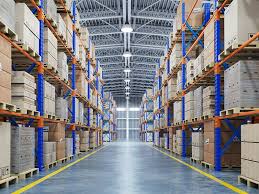
10 Essential Features of Modern Warehousing Services
In today’s fast-paced global economy, modern warehousing plays a critical role in ensuring seamless supply chain operations. Warehousing has evolved significantly from simple storage facilities to sophisticated logistics hubs that integrate cutting-edge technology, automation, and customer-centric services. Here, we delve into ten essential features of modern Warehousing Services in India, highlighting their importance and the benefits they bring to businesses.
1. Strategic Location
One of the hallmarks of a modern warehousing facility is its strategic location. Proximity to key transportation hubs such as highways, ports, and airports ensures quicker and more efficient distribution of goods. This reduces transportation costs, improves delivery times, and enhances supply chain reliability.
Benefits:
-
Faster shipping and reduced transit times.
-
Lower freight and last-mile delivery costs.
-
Enhanced accessibility for global trade.
Example:
Major e-commerce companies often establish fulfillment centers near metropolitan areas to ensure same-day or next-day delivery capabilities.
2. Advanced Inventory Management Systems
Gone are the days of manual inventory tracking. Modern warehousing services leverage advanced inventory management systems (IMS) to provide real-time visibility into stock levels. These systems often use barcode scanning, RFID tags, and IoT devices to track inventory with precision.
Benefits:
-
Reduced stockouts and overstock situations.
-
Improved inventory accuracy and control.
-
Simplified inventory forecasting.
Example:
Automated alerts for low-stock levels ensure timely reordering, reducing the risk of supply chain disruptions.
3. Automation and Robotics
Automation is revolutionizing the warehousing industry. From robotic picking systems to automated guided vehicles (AGVs), these technologies enhance operational efficiency and reduce labor dependency.
Benefits:
-
Increased productivity and faster order fulfillment.
-
Reduced human error and improved accuracy.
-
Lower labor costs and operational expenses.
Example:
Amazon’s use of Kiva robots in their warehouses has set a benchmark for automated warehousing, enabling faster picking and packing of goods.
4. Climate-Controlled Storage
Certain products, such as pharmaceuticals, food, and electronics, require specific temperature and humidity conditions. Modern warehouses provide climate-controlled storage to ensure product integrity.
Benefits:
-
Protection against spoilage and degradation.
-
Extended shelf life for temperature-sensitive goods.
-
Compliance with regulatory standards.
Example:
Cold storage facilities for vaccines maintain temperatures as low as -70°C to preserve their efficacy during distribution.
5. Data Analytics and Business Intelligence
Modern warehousing services integrate data analytics and business intelligence tools to optimize operations. These tools analyze patterns, forecast demand, and provide actionable insights for better decision-making.
Benefits:
-
Enhanced demand planning and resource allocation.
-
Identification of inefficiencies and cost-saving opportunities.
-
Improved customer satisfaction through data-driven strategies.
Example:
Using predictive analytics, a warehouse can anticipate seasonal demand spikes and stock up accordingly, preventing shortages.
6. Scalability and Flexibility
The ability to scale operations based on demand fluctuations is a crucial feature of modern warehousing. Flexible storage solutions cater to seasonal surges or long-term growth without compromising efficiency.
Benefits:
-
Adaptability to changing market conditions.
-
Cost-effective storage during peak seasons.
-
Seamless integration with business growth strategies.
Example:
A retailer can temporarily lease additional warehouse space during holiday seasons to handle increased inventory volumes.
7. Integration with E-commerce Platforms
With the rise of online shopping, warehouses must integrate seamlessly with e-commerce platforms to handle high order volumes and provide real-time updates on inventory and shipping.
Benefits:
-
Streamlined order processing and fulfillment.
-
Enhanced transparency for customers through live tracking.
-
Reduced cart abandonment rates due to faster delivery.
Example:
Warehouses connected to platforms like Shopify or Magento enable automated order fulfillment, reducing manual intervention.
8. Sustainability and Green Initiatives
Environmental sustainability is becoming a priority in warehousing. Green practices such as energy-efficient lighting, solar panels, and recycling programs reduce the environmental impact of warehouse operations.
Benefits:
-
Lower energy costs and operational expenses.
-
Compliance with environmental regulations.
-
Improved corporate social responsibility (CSR) image.
Example:
Tesla’s Gigafactories incorporate renewable energy sources, minimizing their carbon footprint while supporting large-scale production and storage.
9. Enhanced Security Systems
The safety of stored goods is paramount. Modern warehouses deploy advanced security systems, including surveillance cameras, access control mechanisms, and cybersecurity measures for data protection.
Benefits:
-
Protection against theft, vandalism, and cyber threats.
-
Assurance of product integrity for clients.
-
Compliance with insurance and regulatory requirements.
Example:
Biometric access control ensures only authorized personnel can access sensitive storage areas.
10. Value-Added Services
Modern warehousing goes beyond storage to offer value-added services like kitting, assembly, packaging, and labeling. These services enhance operational efficiency and provide a one-stop solution for businesses.
Benefits:
-
Reduced lead times and operational complexities.
-
Improved customization options for end customers.
-
Streamlined supply chain operations.
Example:
A warehouse that offers custom gift wrapping for e-commerce orders adds convenience and value for retailers.
Conclusion
Modern Warehousing Services in India are indispensable in today’s competitive marketplace. By embracing advanced technology, strategic planning, and customer-centric solutions, these facilities ensure businesses can meet their operational and logistical goals efficiently. Companies investing in modern warehousing features gain a significant edge by optimizing supply chains, reducing costs, and delivering exceptional value to their customers. Whether it’s through automation, sustainability, or enhanced security, the warehousing industry continues to evolve, setting new benchmarks for excellence in logistics.